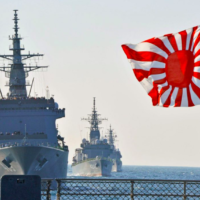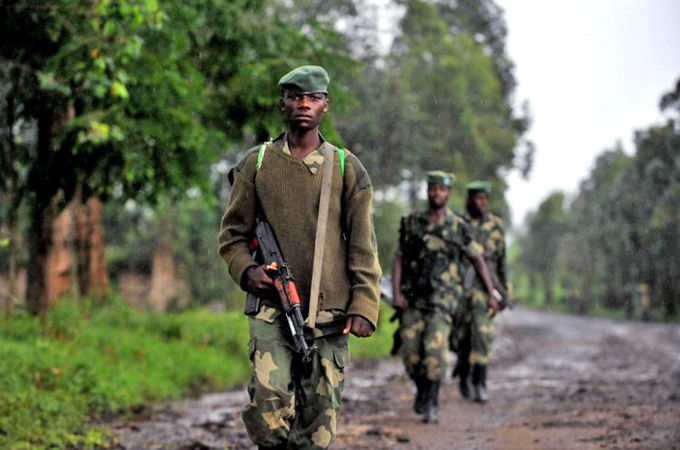In the wake of a decrease in the number of recorded incidents of illicit maritime activities in the last few years, the institutional landscape utilised by the affected states to combat illicit maritime activities is developing slowly, but not universally, throughout the region of the Gulf of Guinea (GoG). Using Denton and Harris‘ (2019) findings as a reference point, [1] this article analyses the influence of recent national and international regulations on maritime security in the region.
Most sovereign states espouse the contemporary definition of piracy under public international law, the United Nations Convention on the Law of the Sea (UNCLOS). [2] To constitute an act of piracy, an incident must fulfil the four-point conditionality of Article 101(a) UNCLOS. As M. Bob Kao from the Queen Mary University of London points out, maritime piracy involves “(1) an illegal act of violence or detention, (2) committed for private ends, (3) on the high seas, and (4) by one ship on another ship”. [2] Nevertheless, there exists a distinction between attacks at sea and closer inland. The second category is not covered by the UNCLOS definition of piracy. Instead, it relies on a separate document, the International Maritime Organisation’s (IMO) Code of Practice for the Investigation of the Crimes of Piracy and Armed Robbery Against Ships, for a legal definition. [2]
Background and Origins of Piracy in the Gulf of Guinea
Modern-day maritime piracy and armed robbery in the GoG became proliferated in the mid-2000s, and its occurrence coincides temporally with the emergence of insurgency in the Niger Delta located in southern Nigeria. [3] The geographic and political background of the insurgency is interconnected with the processes of oil exploration and production in the region. The GoG encompasses two major oil and natural gas producers, Nigeria and Angola, cumulatively responsible for about 3% of global oil production [4] and possessing a similar share of proven natural gas reserves. [5] The resource-abundant Niger Delta, which attracted foreign investments and companies in the oil and gas industry, subsequently became a hotspot of the insurgency.
In large part, the instability was compounded by the multiple systemic challenges of widespread unemployment, poverty, social deprivation and administrative neglect, which the local population had been facing, according to a 2006 report by the United Nations Development Programme. [6] As Hassan and Hasan (2017) note, the energy companies, having been granted permits for oil exploration and production, presented disruptions to the economic life of local communities, in particular with respect to farming and artisanal fishing. [7] Thus materialised the Movement of the Emancipation of Niger Delta (MEND), which Jennifer Hazen and Jonas Horner from the Geneva Graduate Institute described as a “loose assemblage of militant groups” [8] that began undertaking operations from within the Niger Delta to disrupt commercial oil extraction, production or transportation, including further out at sea.
Per International Maritime Bureau 2023 data, the success rate of perpetrators in boarding the seafaring vessels stood just over 75% in the GoG region. [9] In the early years of maritime piracy in the GoG, pirates would primarily rob the vessels and depart with the loot. Until the mid-2010s, most successful attacks resulted in hijackings, primarily of oil tankers, to be taken to arranged locations onshore. Since 2016, with the decrease in global oil prices, the pirates’ predominant tactic has shifted to kidnapping crew for ransom. [10] According to the 2022 UN Secretary-General report on piracy, the direct and indirect costs of piracy and armed robbery in the GoG region amount to roughly $1.9 billion annually. [11] The annual ransom payments to pirate groups total at about $4m, [12] whilst the value of goods (mostly oil) stolen in hijackings decreased from about $2m-6m per attack in the early 2010s to likely less than $1m annually by 2021. [12]
Regulatory Efforts to Curb the Prevalence of Piracy
Within the last decade, significant changes were made to the modus operandi of the pirate groups. The enhanced capacity of these groups to intercept seafaring vessels at greater distances from the shores, well within the international waters, prompted multiple national governments and intergovernmental organisations to introduce regulations.
During the 2013 Yaoundé joint summit of the Economic Community of West African States (ECOWAS), the Economic Community of Central African States (ECCAS), and the Gulf of Guinea Commission (GGC), a legally non-binding instrument was adopted to fight the spread of piracy – the Yaoundé Code of Conduct. The framework was built on two core principles of a) information-sharing between the parties to the protocol through permanent communication channels, and b) criminalisation of acts of piracy and armed robbery at sea in national legal orders. The document establishing the Yaoundé framework adopts the UNCLOS and IMO terminology on piracy and armed robbery verbatim, attempting to coordinate the regional legal regime with international law. [13]
As of 2023, the criminalisation of piracy and the establishment of universal jurisdiction in the matter of prosecution of acts of piracy has been achieved mostly in the western section of the GoG region: in Cabo Verde, Senegal, Liberia, Togo and Nigeria, leading to criminal convictions in the latter two countries in 2021. [14] Indeed, data from the United Nations Office on Drugs and Crime (UNODC) point to a partial shift of the illicit maritime activities eastwards after 2020 toward the ECCAS states, which have not been as successful in institutionalising changes. [11] The 2022 UN Secretary-General report on piracy in the GoG alleges, though, that the geographic shift is likely to be temporary, as that is where the bulk of economic activity and commercial trade related to oil production is concentrated. [11]
Negative Influences on the Institutionalisation of New Norms
The GoG states face certain systemic hurdles inhibiting compliance with the Yaoundé framework. Some are discussed in the following paragraphs, though the list is not exhaustive.
Firstly, as a non-binding document, its implementation is contingent on the political will of signatories. However, as scholars of International Relations from the neoliberal school of thought, like Ikenberry (2001), previously remarked, trust-building through cooperation is an important component in creating multinational regimes and rules. [15] According to a 2015 Royal Danish Defence College report on maritime security in the GoG, high levels of distrust and, in some cases, territorial disputes are present among neighbouring countries in the GoG. [16] If endemic to local political systems, one can observe how these factors are antithetical to sustained regional cooperation and institution-building.
Secondly, as articulated by various scholars, the overall rate of trust in institutions is generally low in sub-Saharan Africa. [17] This trend is prevalent among the young, urban and educated populations, but it is especially apparent in localised ethnic communities which perceive unfair treatment by national governments. [18] Taking this argument further and seeing that the states of sub-Saharan Africa and the GoG are virtually exclusively multiethnic societies, the trust levels are bound to be geographically specific. The Niger Delta harbours a prominent case of such ethnic group, the Ijo, which tends to interpret their minority status as a tool of political control by the majority ethnic groups. [19] This feeds a vicious cycle of lower access to essential social services, though the problem is being addressed by state governments in Nigeria through ongoing infrastructure projects. [20] Likewise, it fosters a proclivity for engaging in unreported employment, thus depriving the federal government of funds which could be directed towards diminishing the problem. [21]
Thirdly, the 2022 UN Secretary-General report attributes shortcomings of the framework to combat piracy to insufficient human resources and unstable funding by national governments and regional organisations party to the framework. Particularly, the shortage of permanent staff for the onshore coordination centres for information exchange substantially reduces the states’ operational capability to remotely coordinate naval responses against illicit activities at sea. [11]
The centres are financed through a grant system from the ECCAS and ECOWAS pooled resources. However, since the centres do not operate according to a fixed budget, the grant scheme does not yield stable funding, often leading to delays or non-payment of contributions, primarily in the ECOWAS-funded centres. [22] The staffing shortage is similarly rooted in the lack of legal clarity in the Code of Conduct, which completely omits staff remuneration, leaving it as a responsibility of the signatories. Nonetheless, the signatories have not yet introduced any further rules on allowances for staff. [22]
Low levels of trust in cross-border cooperation compound an already severe understaffing problem due to insufficient finances. Consequently, some states are reluctant to provide staff for the Interregional Coordination Centre, functioning as a link between the two regional centres that join the ECCAS- and ECOWAS-based multinational centres, due to their hesitancy to cede a part of their national sovereignty. [23]
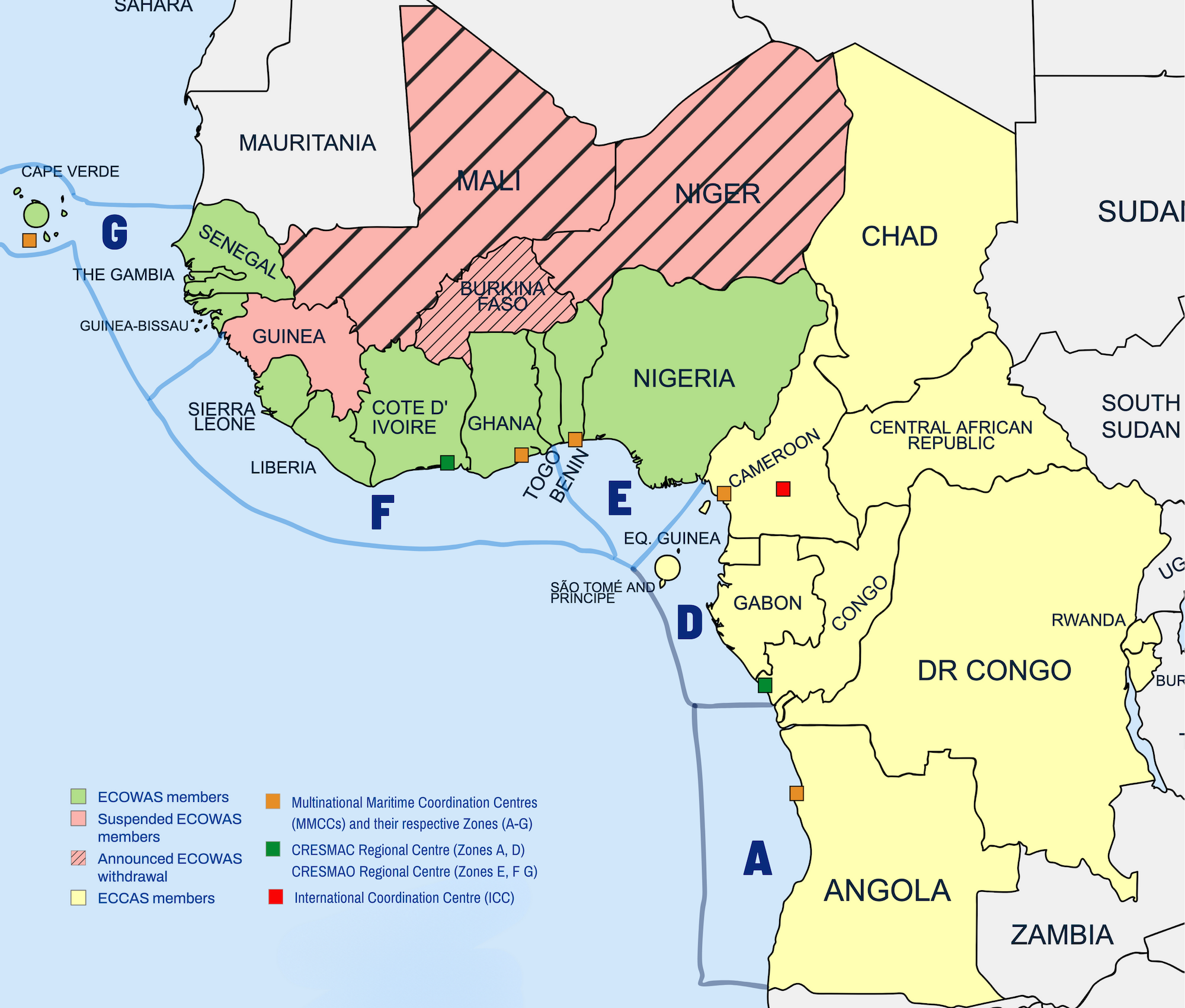
Governance Challenges and Corruption in the GoG Region
When considered from a more holistic perspective, the aforementioned factors are connected via a common denominator: weak governance and high rates of corruption in the region. [11] [22] [24] Report from a study by Jacobsen et al. (2021) funded by the Danish government, looking specifically at Nigeria, lists corruption within the national agency responsible for maritime safety and apprehension of criminal suspects and low rates of prosecution for the acts of piracy as the enabling factors of illicit activities at sea. [10]
In light of the findings of the aforementioned reports, it might be assumed that many neighbouring countries are likely to face similar issues, though these instances should not be extrapolated as a systemic issue implicitly present in national legal orders throughout the region. The Corruption Perceptions Index published by Transparency International records perceived levels of public sector corruption on a 0-100 scale, where 100 stands for least corruption. The 2023 index saw all but three (Ghana, Benin and Senegal) countries in the GoG region score a below-average score of less than 43 out of a hundred. [25] Transparency International also comments that whilst anti-corruption strategies and reforms are underway in the GoG states, impunity for corruption remains high. [26]
Back in 2013, the policy institute Chatham House released a report which alleged widespread corruption among high-level political figures and military officials. It mentions supposed instances of army and navy personnel who patrol the region letting go of vessels engaging in maritime piracy or by either their own volition or after facing political pressure from senior public officials and committing oil theft themselves. [27]
The report from Jacobsen et al. (2021), citing UNOCD data and primary research data from semi-structured interviews with maritime industry workers and regional academic and security experts, held that by early 2021, eight years into the adoption of the Yaoundé architecture, law enforcement and security forces in Nigeria faced systemic corruption and would occasionally collude with piracy groups. [10] Importantly, the report attributed much of the problem to insufficient equipment and training of security forces tasked with combatting maritime piracy. In other words, the domestic naval response units would often lack the ability to navigate the waters due to a shortage of qualified personnel or naval assets in many locations where the piracy groups operated. [10]
Going Beyond the Military Involvement
Denton and Harris (2019) have found that not the often invoked military capacity but rather (good) governance and political regime types seem to be the main determinants of the (non-)pervasiveness of piracy in the GoG region. [1] Inspired by their findings, the remainder of the article looks at some empirical evidence of the decline in piracy and armed robbery incidents in the period after 2020. This period of decline was accompanied by extensive deployment of naval assets by local (Nigeria) and foreign navies (Denmark, France, Russia, India, etc.) alike. [11] This alone is not inconsistent with the authors’ findings, as they focused on how much domestic military capabilities are a predictor for levels of piracy.
Let us assume Denton and Harris’ (2019) position that changes to governance and shifts in political regime types towards the extreme poles of autocracy and democracy affect the prevalence of piracy. Then, to explain the observed reversal in the piracy trend – what, if any, factors of domestic politics accompanied this period of decrease in piracy incidents?
To provide an answer, this article observes changes in institutional and legal frameworks introduced to the political systems of states spanning the region, with special attention to Nigeria. The choice is motivated by the absolute number of recorded incidents being heavily centred around Nigeria and, as Denton and Harris (2019) outline, Nigeria’s political and economic influence in the region. [1]
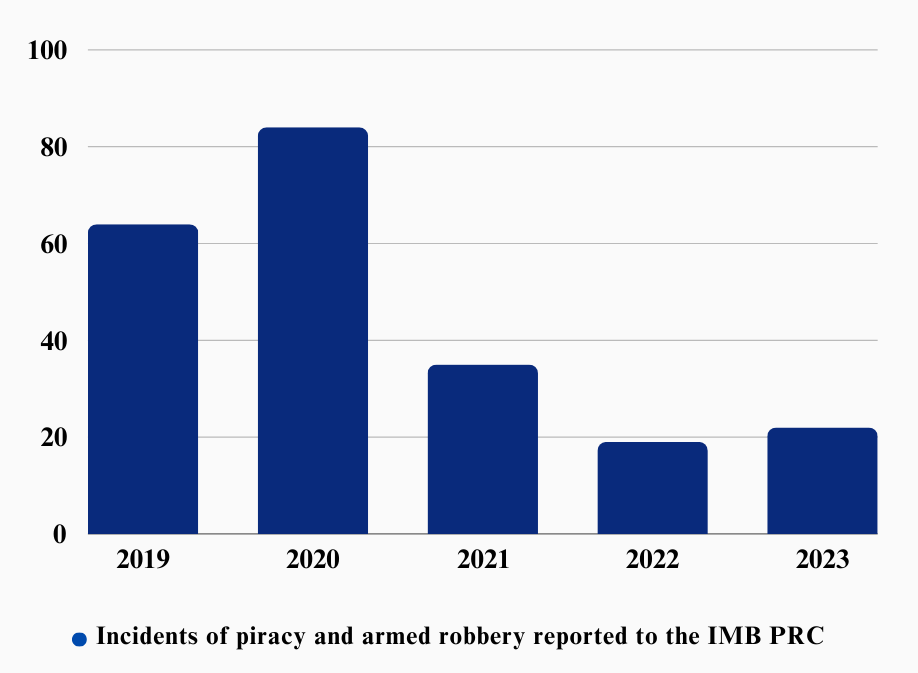
Progress on the Rule of Law and Strengthening Joint Anti-Piracy Response Centres
It is necessary to preface the paragraph by emphasising the interplay of multiple factors in the post-2020 decline of piracy in the Gulf of Guinea. Broadly speaking, after the start of the COVID-19 pandemic, a decline in maritime attacks on ships could be observed globally. [28] From available data points, it is seen that piracy in the GoG follows patterns of weather-driven seasonality. Yet, it did not reappear during October 2021 at the start of the season with stable weather. [14]
As the follow-up report by Jacobsen et al. (2023) elucidates, the criminal convictions for piracy in Togo and Nigeria led to multiple prison sentences and fines in July 2021, potentially sending a strong message to would-be pirates about strengthening the rule of law in the criminal justice systems. [14] As a part of the Deep Blue Project, the Nigerian government procured assets at a total cost of about $200m, including a command and control communications centre in Lagos. Whilst occurring almost concurrently, the maritime security project cannot be singled out as a factor responsible for decreased piracy. [29] Instead, the successful convictions for piracy and the presence of international naval patrols are thought to have played a role in the decline in piracy attacks. [30] Nigeria, Togo, Ghana, Benin and Equatorial Guinea also allowed private maritime security companies to operate in the waters jointly with regional navies, thereby partially offsetting the personnel shortages in law enforcement units. [14]
Onshore developments are equally important in terms of the conditions that enable or motivate piracy attacks. Critically, the UN Assistant Secretary-General for Africa Martha Pobee claimed that the main drivers of piracy, such as unemployment and lack of public services, little in the way of mitigating the intent of pirates to conduct illicit activities. [30] Lending credibility to these claims is the observed increase in riverine crime, which accompanies the decrease in offshore attacks. [11] [31] Riverine crime includes activities such as oil bunkering and theft, presently perceived yield more profit at less risk than offshore activities. [11] The latter indicates that the intent to engage in piracy persists, as do the enabling economic and social conditions.
United Nations Resolution Provides an Impetus for Accelerating Reforms
Throughout 2022, intergovernmental organisations such as the UN (via the Security Council) and the African Union (via the Peace and Security Council) convened to address maritime piracy in the GoG. The former adopted Resolution 2634 in May 2022, exerting pressure on national governments to criminalise maritime piracy and armed robbery and expand its law enforcement capabilities to thwart attacks on seafarers. [32]
Shortly thereafter, in July 2022, at a head of state meeting, ECOWAS adopted the Supplementary Act on transferring piracy suspects, associated property, and evidence among the member states to prosecute the acts of maritime piracy. [33] Upon its latest convocation in September 2023, the Peace and Security Council commented on the need for a uniform implementation of the regional Yaoundé framework and the ratification of the Lomé Charter, a pan-African legal framework on maritime security. [34]
The following table provides an overview of the progress of laws criminalising maritime piracy and establishing a legal definition of piracy in accordance with UNCLOS, valid as of February 2024. Data with an older date of origin is marked with a “*” for 2023 and a “**” for 2022. The data for the table is synthesised from the November 2022 UN Secretary-General report on maritime piracy in the GoG, a July 2023 article by the African Defense Forum, a quarterly defence magazine supported by the United States Africa Command and the November 2023 report on the same matter by Jacobsen et al. (2023). [11] [14] [35] Otherwise, data is sourced from the official government websites, the Official Gazettes and legal databases of the respective countries.

Worth mentioning is the case of Cameroon, which approved and adopted a new law on the suppression of piracy in December 2022. Nevertheless, the law did not meet the UNCLOS definition of piracy due to the omission of acts of detention and depredation as distinct forms of violence constituting piracy. Cameroon is also yet to establish a universal jurisdiction for prosecuting acts of piracy. [14] Like most other countries in the GoG region, it could not detain and prosecute non-nationals for maritime piracy and armed robbery at sea. This is troubling since an increasing number of perpetrators in recent attacks have not come from the country in whose territorial waters or vicinity the illicit activities took place – such as the 2022/2023 kidnappings in Gabonese waters, whose perpetrators were determined to be based in the Niger Delta. [14] Others, such as Côte d’Ivoire, Ghana or Sao Tome and Principe, have made progress in crafting their maritime security strategies. In the case of Ghana, while emphasis still lies on the deterrence of would-be pirates, attention is given to addressing onshore enabling or causal factors of maritime piracy, chiefly youth unemployment. [52] In this sense, there is ambition to address the causes of piracy rather than the symptoms.
Regime Types and the Ambition of Anti-Piracy Measures
To complete the brief analysis, we return to Denton and Harris’s (2019) findings on regime types being a predictor for the prevalence of piracy. This article comes short of suggesting causality; however, it explores the regime types of the countries that adopted a UNCLOS-conform definition of piracy and those that did not, nor are presently working on adopting such laws. The former group (A) includes Cabo Verde, Liberia, Nigeria, Togo and Senegal. Meanwhile, the latter group (B) hosts Congo, the DRC, Equatorial Guinea, Guinea-Bissau and Sierra Leone. To determine their regime types, we utilise the V-Dem project’s data building on the classification of regime types by Lührman et al. (2018) on an ordinal scale from 0 (most autocratic) to 10 (most democratic). [53]
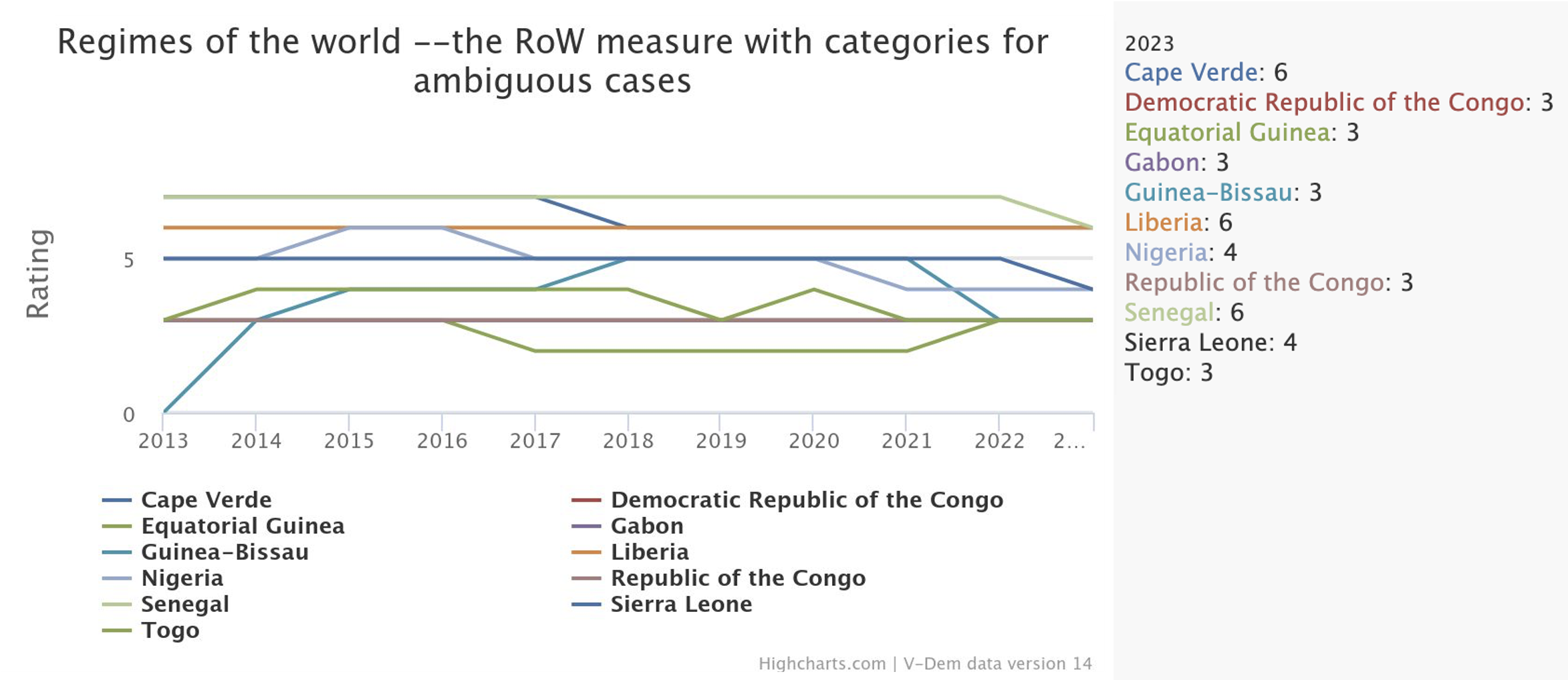
Setting the data cut-off point to 2013, when the Yaoundé framework was instated, there appear to be two observational trends in the data. Group A features countries with mostly stable and higher ranking (Cabo Verde, Senegal and Liberia), and Nigeria and Togo, which stood at 6 and 5 before decreasing to 4 and 3 respectively in 2023.
Group B, especially Congo, the DRC and Equatorial Guinea, consistently ranked at 3. The outliers are Sierra Leone, which generally ranks stably at 5, but decreased to 4 in 2023. Another outlier, Guinea-Bissau, rose from 0 to 5 and decreased back to 3 within a decade. Both these outliers, however, featured a coup attempt during the second half of 2023. [54] [55] In Denton and Harris’ terms, this instability might be conducive to piracy occurring in these regions. However, according to the International Maritime Bureau’s Piracy Reporting Centre, only three attacks occurred off Sierra Leone’s coast in 2022 and 2023, and none were near Guinea-Bissau. [56] Interestingly, though Gabon has introduced new maritime security legislation, it is in the vicinity of its and Equatoguinean waters where more attacks have been recorded since 2020. [14] Besides, Gabon witnessed a successful coup in August 2023 and was temporarily suspended from the ECCAS. [57]
Conclusion and Recommendations for Further Action
In conclusion, the recent developments in the rule of law and strengthening shared institutions to monitor and deter piracy have shown promising development. Nevertheless, the GoG region still faces on-shore challenges of local inaccessibility of public services, high youth unemployment, low public trust in institutions and a high rate of corruption perception.
Therefore, the systemic causes, rather than their effects, must be fully addressed to observe long-term decreases in illicit maritime activities over the region. In many cases, these include limiting youth unemployment or strengthening the rule of law and improving access to justice. Additionally, mechanisms for information sharing and coordination of action between the states must achieve fully operational capacity in order to intercept and detain pirates more successfully.
Altogether, universal adoption of and adherence to the Yaoundé framework and other ECOWAS/ECCAS-based mechanisms of cooperation in maritime security would make the states in the GOG region better suited to counter the threat of maritime piracy and other illicit activities at sea.
Article reviewed by Stanislav Šturdík and Veronika Zwiefelhofer Čáslavová
Sources
[1] Denton, G. L., & Harris, J. R. (2019). Maritime Piracy, Military Capacity, and Institutions in the Gulf of Guinea. Terrorism and Political Violence, 34(1), 1-27. https://doi.org/10.1080/09546553.2019.1659783
[2] Kao, M. B. (2016). Against a Uniform Definition of Maritime Piracy. Maritime Safety and Security Law Journal, 3, 1-21. https://www.marsafelawjournal.org/wp-content/uploads/2016/10/Issue3_KAO_Article.pdf
[3] Kamal-Deen, A. (2015). The Anatomy of Gulf of Guinea Piracy. Naval War College Review, 68(1), 93-118.https://digital-commons.usnwc.edu/nwc-review/vol68/iss1/7/
[4] United States Energy Information Administration. (2022). Annual petroleum and other liquids production [Data set]. Retrieved from https://www.eia.gov/international/data/world/petroleum-and-other-liquids/annual-petroleum-and-other-liquids-production
[5] United States Energy Information Administration. (2020). Natural gas [Data set]. Retrieved from https://www.eia.gov/international/data/world/natural-gas/more-natural-gas-data
[6] United Nations Development Programme. (2006). Niger Delta Human Development Report (Report No. not assigned). United Nations. Retrieved from https://hdr.undp.org/system/files/documents/nigeriahdrreportpdf.pdf
[7] Hassan, D., & Hasan, S. (2017). Effectiveness of the Current Regimes to Combat Piracy in the Gulf of Guinea: An Evaluation. African Journal of Legal Studies, 10(1), 35-65. https://doi.org/10.1163/17087384-12340014
[8] Hazen, J. M., & Horner, J. (2007). Small Arms, Armed Violence, and Insecurity in Nigeria: The Niger Delta in Perspective. Geneva, Switzerland: Small Arms Survey. Retrieved from http://www.jstor.org/stable/resrep10752
[9] International Chamber of Commerce. (2024, January 11). New IMB report reveals concerning rise in maritime piracy incidents in 2023. ICC, Commercial Crime Services division. Retrieved from https://www.icc-ccs.org/index.php/1342-new-imb-report-reveals-concerning-rise-in-maritime-piracy-incidents-in-2023
[10] Jacobsen, K. L., Sernia G., & Faipoux, H. (2021). Pirates of the Niger Delta: Between brown and blue waters(Report No. not assigned). United Nations Office on Drugs and Crime, Global Maritime Crime Programme. Retrieved from https://www.unodc.org/res/piracy/index_html/UNODC_GMCP_Pirates_of_the_Niger_Delta_between_brown_and_blue_waters.pdf
[11] United Nations Secretary-General. (2022). Situation of piracy and armed robbery at sea in the Gulf of Guinea and its underlying causes: Report of the Secretary-General (Report No. S/2022/818). Retrieved from https://www.securitycouncilreport.org/atf/cf/%7B65BFCF9B-6D27-4E9C-8CD3-CF6E4FF96FF9%7D/S_2022_818.pdf
[12] Bell, C., Huggins, J., Benson, J., Joubert, L., Okafor-Yarwood, I., Ebiede, T. M., & Faipoux, H. (2021). Pirates of the Gulf of Guinea: A Cost Analysis for Coastal States (Report No. not assigned). Stable Seas. Retrieved from https://www.unodc.org/documents/Maritime_crime/UNODC_Pirates_GoG_A_Cost_Analysis_for_Coastal_States.pdf
[13] Code of Conduct Concerning the Repression of Piracy, Armed Robbery Against Ships, and Illicit Maritime Activity in West and Central Africa [Intergovernmental Protocol]. (2013). Retrieved from https://wwwcdn.imo.org/localresources/en/OurWork/Security/Documents/code_of_conduct%20signed%20from%20ECOWAS%20site.pdf
[14] Jacobsen, K. L., Morizur, F., Ebiede, T. M., Omiunu, F. I., & Faipoux, H.. (2023). Pirates of the Niger Delta II: An Update on Piracy Trends and Legal Finish in the Gulf of Guinea (Report No. not assigned). United Nations Office on Drugs and Crime, Global Maritime Crime Programme. Retrieved from https://www.unodc.org/documents/nigeria//Pirates_of_the_Niger_Delta_An_Update_on_Piracy_Trends_and_Legal_Finish_in_the_Gulf_of_Guinea.pdf
[15] Ikenberry, G. J. (2001). After Victory: Institutions, Strategic Restraint, and the Rebuilding of Order After Major Wars. Princeton, New Jersey: Princeton University Press.
[16] Jacobsen, K. L., & Nordby, J. R. (2015). Maritime Security in the Gulf of Guinea (Report No. not assigned). Royal Danish Defence College. Retrieved from https://research.fak.dk/esploro/outputs/report/Maritime-security-in-the-Gulf-of/991815954503741
[17] Cho, W., & Kirwin, M. F. (2007). A Vicious Circle of Corruption and Mistrust in Institutions in Sub-Saharan Africa: A Microlevel Analysis (Report No. 71) [Working paper]. Afrobarometer. https://www.files.ethz.ch/isn/92129/AfropaperNo71_A_Vicious.pdf
[18] Dirksmeier, P., Nolte, K., Mewes, L., & Tuitjer, L. (2023). The role of climate change awareness for trust in institutions in sub-Saharan Africa. Environmental Research Letters, 18(9), Article number 094043. https://doi.org/10.1088/1748-9326/acf0d6
[19] Ukiwo, U. (2007). From “Pirates” to “Militants”: A Historical Perspective on Anti-State and Anti-Oil Company Mobilization among the Ijaw of Warri, Western Niger Delta. African Affairs, 106(425), 587-610. https://doi.org/10.1093/afraf/adm057
[20] Asei, D. I. (2023, June 3). The Socioeconomic Impact Of The Yenagoa-Oporoma Road On The People Of Southern Ijaw And The Rest Of Bayelsa State. Medium. https://medium.com/@daveasei/the-socioeconomic-impact-of-the-yenagoa-oporoma-road-on-the-people-of-southern-ijaw-and-the-rest-of-786d4aca7e0b
[21] Watts, M. J. (2018). Frontiers: Authority, Precarity, and Insurgency at the Edge of the State. World Development, 101, 477-488. https://doi.org/10.1016/j.worlddev.2017.03.024
[22] Anabia-Tiah, R. K. (2022). Assessing the effectiveness of maritime centres in the context of the implementation of the Code of Conduct Concerning the Repression of Piracy, Armed Robbery against Ships and Illicit Maritime Activity in West and Central Africa (Yaounde Code Of Conduct) [Dissertation Thesis]. Retrieved from https://commons.wmu.se/cgi/viewcontent.cgi?article=3143&context=all_dissertations
[23] Yücel, H. (2021). Sovereignty and Transnational Cooperation in the Gulf of Guinea: How a Network Approach can Strengthen the Yaoundé Architecture. Scandinavian Journal of Military Studies, 4(1), pp. 146–157. https://doi.org/10.31374/sjms.90
[24] Greminger, T., & Al-Rodhan, N. (2022). Maritime Security: Piracy in the Gulf of Guinea [Policy brief]. Geneva Centre for Security Policy. Retrieved from https://www.gcsp.ch/publications/maritime-security-piracy-gulf-guinea
[25] Transparency International. (2024). Corruption Perceptions Index 2023 (Report No. not assigned). Retrieved from https://images.transparencycdn.org/images/CPI-2023-Report.pdf
[26] Banoba, P., Mwanyumba, R., & Kaninda, S. (2024, January 30). CPI 2023 for Sub-Saharan Africa: Impunity for corrupt officials, restricted civic space & limited access to justice. Transparency International. Retrieved from https://www.transparency.org/en/news/cpi-2023-sub-saharan-africa-corruption-impunity-civic-space-access-justice
[27] Anyimadu, A. (2013). Maritime Security in the Gulf of Guinea: Lessons Learned from the Indian Ocean (Report No. not assigned). Chatham House. Retrieved from https://www.chathamhouse.org/sites/default/files/public/Research/Africa/0713pp_maritimesecurity_0.pdf
[28] Statista Research Department. (2023, December 8). Number of pirate attacks against ships worldwide from 2010 to 2022 [Infographic]. Statista. Retrieved from https://www.statista.com/statistics/266292/number-of-pirate-attacks-worldwide-since-2006/
[29] Anderson, M. (2022). Where have the pirates gone? Maritime Security in West Africa. Dryad Global. Retrieved from https://www.dryadglobal.com/west-africa-piracy-where-have-the-pirates-gone
[30] United Nations. (2023, June 21). Ongoing Decline in Gulf of Guinea’s Piracy, Armed Robbery Encouraging, But Support Needed to Fully Implement Yaoundé Architecture, Briefers Tell Security Council [Press release]. Retrieved from https://press.un.org/en/2023/sc15331.doc.htm
[31] Petit, Z. (2023, June 11). The Gulf of Guinea: From Piracy to Oil Bunkering. Grey Dynamics. Retrieved from https://greydynamics.com/the-gulf-of-guinea-from-piracy-to-oil-bunkering/
[32] United Nations. (2022, May 31). Adopting Resolution 2634 (2022), Security Council Calls on Gulf of Guinea Countries to Criminalize Piracy, Armed Robbery at Sea under Domestic Laws [Press release]. Retrieved from https://press.un.org/en/2022/sc14915.doc.htm
[33] United Nations Office on Drugs and Crime. (2022, August 29). Heads of State and Government of ECOWAS Member States adopt Supplementary Act for the Transfer of Piracy Suspects and their Associated Property and /or Evidence for prosecution [Press release]. Retrieved from https://www.unodc.org/nigeria/en/heads-of-state-and-government-of-ecowas-member-states-adopt-supplementary-act-for-the-transfer-of-piracy-suspects-and-their-associated-property-and–or-evidence-for-prosecution.html
[34] African Union. (2023, October 5). Communique of the 1174th meeting of the PSC, held on 18 September 2023, on Maritime Security in the Gulf of Guinea. Peace and Security Council of the African Union. Retrieved from https://www.peaceau.org/en/article/communique-of-the-1174th-meeting-of-the-psc-held-on-18-september-2023-on-maritime-security-in-the-gulf-of-guinea
[35] Ngada, T. (2023, July 24). A Decade of Maritime Security: The Yaoundé Code of Conduct Has Had Successes — and Has Room for Growth. Africa Defense Forum. Retrieved from https://adf-magazine.com/2023/07/a-decade-of-maritime-security/
[36] Official Legal Bulletin of Cabo Verde (2021). Law No. 117/IX/2021 of February 11 2021 proceeding with the fourth amendment to the Penal Code, approved by Legislative Decree No. 4/2003, of 18 November [Law]. Retrieved from https://kiosk.incv.cv/1.1.15.3610/
[37] Nigerian Maritime Administration and Safety Agency. (2022). Suppression of Piracy and Other Maritime Offences Act [Law]. Retrieved from https://nimasa.gov.ng/wp-content/uploads/2022/12/Suppression-of-Piracy-and-Other-Maritime-Offences-Act-2019-01.pdf
[38] Ly, O. (2023, February 10). La responsabilité pénale des personnes morales en droit sénégalais [The criminal liability of persons under Senegalese law]. Village de la justice. Retrieved from https://www.village-justice.com/articles/responsabilite-penale-des-personnes-morales-droit-senegalais,45113.html
[39] FAOLEX. (2018). Loi n°2016-004 du 11 mars 2016 relative à la lutte contre la piraterie, les autres actes illicites et l’exercice par l’Etat de ses pouvoirs de police en mer [Law n°2016-004 of 11 March 2016 on the fight against piracy, other unlawful acts and the exercise by the State of its police powers at sea.] [Law]. Food and Agriculture Organisation of the United Nations. Retrieved from https://faolex.fao.org/docs/pdf/Tog179467.pdf
[40] National Assembly of Benin Republic. (2020). Loi N° 2020-23 du 29 septembre 2020 modifiant et complétant la loi n° 2012-15 du 18 mars 2013, modifiée, portant code de procédure pénale en République du Bénin [Law No. 2020-23 of 29 September 2020 amending and supplementing Law No. 2012-15 of 18 March 2013, as amended, on the Code of Criminal Procedure in the Republic of Benin.] [Law]. The Documentations Centre of the National Assembly of Benin Republic. Retrieved from https://www.documentation-anbenin.org/files/original/2155/loi-2020-23.pdf
[41] Honniball, A. N. (2023, January 20). Cameroon: Law No 2022/017 on Unlawful Acts at Sea. De Maribus. Retrieved from https://demaribus.net/2023/01/20/cameroon-law-no-2022-017-on-unlawful-acts-at-sea/
[42] JURIAFRICA. (n.d.). Loi N° 2017-442 du 30 Juin 2017 portant Code maritime [Law No. 2017-442 of 30 June 2017 on the Maritime Code] [Law]. Retrieved from https ://www.juriafrica.com/lex/art-1008-code-maritime-cote-ivoire-46324.htm
[43] Government of Côte d’Ivoire. (2023, September 25). Le Secrétariat Permanent du Comité Interministériel de l’Action de l’État en Mer [The Permanent Secretariat of the Interministerial Committee for State Action at Sea] [Social media post]. LinkedIn. Retrieved from https://www.linkedin.com/posts/sepcim-aem-888a251a0_sepcimactus-onudc-s%C3%A9curit%C3%A9-activity-7112115711707074561-LY2K
[44] Offical Journal of the Republic of Gabon. (2020, June 30). Loi N° 006/2020 du 30/06/2020 portant modification de la loi n°042/2018 du 05 juillet 2019 portant Code Pénal de la République Gabonaise [Law No. 006/2020 of 30/06/2020 amending Law No. 042/2018 of 05 July 2019 on the Criminal Code of the Gabonese Republic] [Law]. Retrieved from https://journal-officiel.ga/4704-006-2020-/
[45] Cham, J. (2020, February 28). Stakeholders Validate Gambia Integrated Maritime Sector Strategy. The Point. Retrieved from https://thepoint.gm/africa/gambia/article/stakeholders-validate-gambia-integrated-maritime-sector-strategy
[46] Anku, M. (2023, July 7). Maritime Offences Bill 2022 progressing steadily. Ghana News Agency. Retrieved from https://gna.org.gh/2023/07/maritime-offences-bill-2022-progressing-steadily/
[47] Ghana Navy. (2023, September 13). C-IN-C Launches National Integrated Maritime Strategy, Opens IMDEC 23[Press release]. Retrieved from https://navyonline.mil.gh/blogs/c-in-c-launches-national-integrated-maritime-strategy-opens-imdec-23
[48] National Assembly of Sao Tome and Principe. (2022). Proposta de Lei n.º 38/XI/8.ª/2022 – Lei-quadro da Estratégia de Transição para a Economia Azul [Draft Law no. 38/XI/8.ª/2022 – Framework Law for the Blue Economy Transition Strategy] [Law]. Retrieved from https://www2.camara.leg.br/saotomeeprincipe/diarios-da-an/xi-legislatura-22-11-2018/ii-serie-a/8.a-sessao/DAN14-IIS.pdf/view
[49] FAOLEX. (2022). Lei N.º 34/22 Que altera a Lei n.º 27/12, de 28 de Agosto — Lei da Marinha Mercante, Portos e Actividades Conexa [Law No. 34/22 Amending Law no. 27/12 of 28 August – Merchant Marine, Ports and Related Activities Law] [Law]. Food and Agriculture Organisation of the United Nations. Retrieved from https://faolex.fao.org/docs/pdf/ang116896.pdf
[50] Embassy of Equatorial Guinea in Spain. (2020, December 5). Guinea Ecuatorial propone la organización de un Fórum Regional sobre piratería marítima [Equatorial Guinea proposes the organisation of a Regional Forum on Maritime Piracy]. Retrieved from https://xn--embajadadeguineaecuatorialenespaa-yfd.com/guinea-ecuatorial-propone-la-organizacion-de-un-forum-regional-sobre-pirateria-maritima/
[51] Government of the Republic of Guinea. (2019). Loi-ordinaire-L2019/012/AN du 09 mai 2019 portant Code Maritime de la République de Guinée [Ordinary Law-L2019/012/AN of 09 May 2019 on the Maritime Code of the Republic of Guinea] [Law]. Official Journal of the Republic of Guinea. Retrieved from https://prefecture-maritime.gov.gn/wp-content/uploads/2023/05/Loi-ordinaire-L2019012AN-du-09-mai-2019-portant-Code-Maritime-de-la-Republique-de-Guinee.-1.pdf
[52] Sawer, L. (2023, September 4). National Integrated Maritime Strategy to promote maritime job creation in Ghana. Ghana News Agency. Retrieved from https://gna.org.gh/2023/09/national-integrated-maritime-strategy-to-promote-maritime-job-creation-in-ghana/
[53] Coppedge, M., Gerring, J., Knutsen, C. H., Lindberg, S. I., Teorell, J., Altman, D., Bernhard, M., Cornell, A., Fish, M. S., Gastaldi, L., Gjerløw, H., Glynn, A., God, A. G., Grahn, S., Hicken, A., Kinzelbach, K., Krusell, J., Marquardt, K. L., McMann, K., Mechkova, V., Medzihorsky, J., Natsika, N., Neundorf, A., Paxton, P., Pemstein, D., Pernes, J., Rydén, O., Römer, J. V., Seim, B., Sigman, R., Skaaning, S.-E., Staton, J., Sundström, A., Tzelgov, E., Wang, Y., Wig, T., Wilson S., & Ziblatt, D. (2023). Varieties of Democracy (V-Dem) Project [Dataset and code sheet]. https://doi.org/10.23696/vdemds23
[54] Pronczuk, M., & Johnson, J. (2023, November 28). Sierra Leone Announces Arrest of 13 Military Officials in ‘Attempted Coup’. The New York Times. Retrieved from https://www.nytimes.com/2023/11/28/world/africa/sierra-leone-arrests-attempted-coup.html
[55] Rukanga, B., & Booty, N. (2023, December 3). Guinea-Bissau: Attempted coup was foiled, says President Embaló. BBC News. Retrieved from https://www.bbc.com/news/world-africa-67586556
[56] International Chamber of Commerce. (n.d.). Live Piracy Map [Infographic]. International Maritime Bureau Piracy Reporting Centre. Retrieved from https://www.icc-ccs.org/index.php/piracy-reporting-centre/live-piracy-map
[57] Africanews Editorial Office. (2023, December 16). Central African states uphold Gabon’s suspension after army coup. Africanews. Retrieved from https://www.africanews.com/2023/12/16/central-african-states-uphold-gabons-suspension-after-army-coup/



